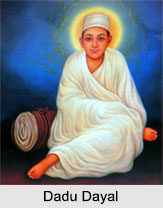 Dadu Dayal is said to be the founder of the Vaishnava sect. He taught Bhakti or implicit faith, is more efficacious than subjugation of the passions, charity, or knowledge. In the tradition of Guru Kabir, Sant Dadu Dayal was a great Bhakti Saint of India. "Dadu" means brother and "Dayal" is "the Compassionate One". He was a poet-mystic and spiritual Master of Divine Light, Sound, and Nirguna Bhakti from Rajasthan. His songs are in a Hindi dialect known as "Braj Bhasa", being a mixture of Hindi and Rajasthani. Dadu clearly experienced the bliss of Sahaja and alluded to it in his songs.
Dadu Dayal is said to be the founder of the Vaishnava sect. He taught Bhakti or implicit faith, is more efficacious than subjugation of the passions, charity, or knowledge. In the tradition of Guru Kabir, Sant Dadu Dayal was a great Bhakti Saint of India. "Dadu" means brother and "Dayal" is "the Compassionate One". He was a poet-mystic and spiritual Master of Divine Light, Sound, and Nirguna Bhakti from Rajasthan. His songs are in a Hindi dialect known as "Braj Bhasa", being a mixture of Hindi and Rajasthani. Dadu clearly experienced the bliss of Sahaja and alluded to it in his songs.
Life of Dadu Dayal
Dadu Dayal was born in Ahmedabad in 1544, he made Rajasthan his home. Like Saint Kabir, Dadu came from one of the many lower artisan castes. It is said that Dadu was a foster son of Lodhi Ram, a Naga Brahmin of Ahmedabad, who had found the infant floating on the waves of the Sabarmati River in 1545. Dadu Dayal lived in the Jaipur region of Rajasthan, most probably as a pinjari, a cotton carder. He married and had a family of two sons and two daughters.
Dadu was cautioned by a voice from heaven to devote himself to a religious life. Thus, Dadu moved to the Baherana Mountain and after some time he disappeared from there and no traces of him could be found thereafter. He attained Samadhi in Naraina in Jaipur district in 1603. Emperor Akbar is said to have been one of his followers.
Dadu Panthis
Sant Dadu Dayal gathered around himself a group of followers, which became known as the "Dadu Panthi". He has thousands of devotees both in Gujarat and Rajasthan who worship him with great reverence and devotion. This organisation has continued in Rajasthan to the present day, and has been a major source of early manuscripts containing songs by the North Indian Saints of the "Panch Vani", including "Dadu Vani". He himself did not write down any of his compositions. Dadu"s compositions were recorded by his disciple Rajjab and are known as the Dadu Anubhav Vaani, a compilation of 5,000 verses. Janagopal another disciple of Dadu Dayal wrote the earliest biography of Dadu.
Temples of Dadu Dayal
Dadu Dayal had 100 disciples who followed his teachings and attained salvation. He instructed an additional 52 disciples to set up ashrams, known as "Thambas" around the region to spread the Lord`s word.
Five Thambas are considered sacred by the followers, namely, Naraina, Bhairanaji, Sambhar, Amer and Karadala (Kalyanpura). Followers of these Thambas then spread and set up other places of worship. Shri Dadu Dham Bhairana, which lies in the secluded hilly tract of Bichoon district in the Jaipur division of Rajasthan, has become a sacred place of pilgrimage.




















